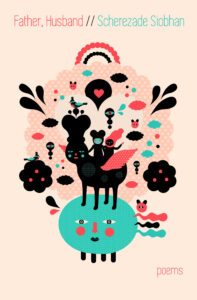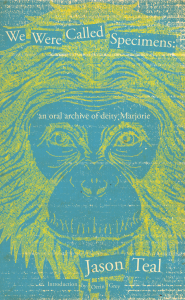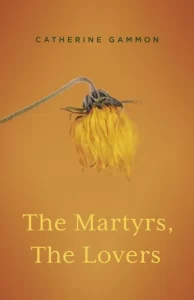Poetry. 112 pgs. Salo Press. December 2015. 9780993350818.
“Poetry,” believes the great Don Patterson, “must transport you from the ground to the sky.” If Scherezade Siobhan has done anything at all, it is to do much better.
At once touching, at times pensive, others sensory. The poetry in her collection, Father, Husband, exudes with a richness, tightness and collective playfulness that hums off the page like a nightingale. The collection tells the unique tale of “a woman spelled as saudade.” The tenderness of each is supported through exquisite wizardry. Linearity is abandoned, the stories of her past instead told in the future continuous present – the once daughter, the never wife… the girl folded into a language of lace curtains in the attic of her childhood.” Often punctuated to mirror the steady march – someone learning to walk and fall on their own two feet – there is something quite remarkable about the collection; the undiluted consistency is what makes the magic. In poetic forms, often consumed with an eye for structural ambiguity and whimsicality, the coherent and steady approach is often underappreciated. But the density of each stanza imitates the stepping action of its protagonist; a deliberate ploy of its author, and one of infinite capability.
You can’t have favourites for collections like this; you can only be swept away in distinct manners. Roshach contains a contemporary buzz:
“Marriages makes libraries out of bedrooms.”
“Music is how I measure distance.”
“Love humbles me with its paranoia.”
Prepare to be moved by After Schizophrenia, with its list-like body of conflicting stanza lengths. There is, as mentioned above, a harmony in it too:
“We were smithereens,
paroxysms,
curated
into a lamellar.”
The internal strife, the pace of decaying rationality is tempered by warming resolution:
“I too am ephemera,
thankful for something
less than forever
something more than
yesterday”.
Siobhan’s hyphenated identity rings true throughout, references to her Indian and Romanian roots affording the reader the possibility to immerse within the author’s own life. Having grown up “displaced, underprivileged and largely swung between two acerbic parents from two entirely different”, the authority of her language, thrusted forward by its emphatic uniformity – is simultaneously courageous and powerful.
It is the visibility of these cultural touches, coincided with our temporal distance, that helps strengthen the artist’s many strokes. There are references to internal struggle, imbued in precision. It is a uniformity rarely seen today, but the ability of each poem to both capture the essence of lived experience, while never limiting the possibility of “universal” appeal, is a remarkable achievement.
Her diction is at times prosaic, using features of embedded narratives to counter any fantastical assertions. In Anomie, the second person narrator blooms with depth and wisdom, before shifting to first person if anything, to convey a more commanding tone:
I want language to gut me to a fishbelly white. I want a language like the photograph of a jaundice-eyed violinist playing at his teacher’s funeral.” Perhaps no such language exists, but it is the unachievable nature of such a command that bleeds its beauty. The poems of this collection are concrete; the reader is encouraged, without explicit mention, to view each stanza – or atom – as crucial in creating the architecture of the “whole”. Nothing is accidental, and yet no word is forced. In other words, the writing is a perfect example of how to create meaning from the oblivion. From what prose writers describe as the “mundane”. In I Thee Bed, the reader’s heart is crushed by one undiluted, rhythmically unsteady line: “Years have taught me how to bed a ghost dressed as a god.”
At the end, there is no take-home message. Nothing can be presumed, only hoped for. No one wins. Everything that has already happened, will happen according to the collection’s extraordinary play on tense. What does this mean? You decide. Though perhaps the book’s greatest message lies at its midway point:
“My pulse is reborn as a pause.
This is an education in how death is always plural.
This is how we best remember loss –
by letting it eat its fill
by feeding it till it forgives.”
Her parting, if this is to be believed, shall be nothing less than a gift to us all…
Father, Husband is available through Salo Press. Purchase it now through their website.
Like what you’re reading?
Get new stories or poetry sent to your inbox. Drop your email below to start >>>
NEW book release
Ghosts Caught on Film by Barrett Bowlin. Order the book of which Dan Chaon calls “a thrilling first collection that marks a beginning for a major talent.”
GET THE BOOK



![REVIEW: [Title] by [name of author]](http://www.bridgeeight.com/wp-content/uploads/2022/05/1447227775.0.x-193x300.jpg)